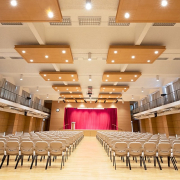
Your Guide to Applying to Schools in Hong Kong
The Hong Kong school system explainedPhoto by Olia Danilevich via Pexels
Hong Kong regularly features high on education barometers as a leading city in which to be schooled. But the system behind the hype is not a straightforward one, so it’s important to get a grasp of a few things before your search for a school can begin.
Many schools, such as the ESF schools, base their Primary One admissions on the calendar year (children born from January to December). Others, such as Kellett, go by the academic year (children born from September to August).
Local vs. International
Broadly speaking, schools in Hong Kong fall into two camps: local schools and international schools.
The criterion for this segregation is that local schools teach the Hong Kong curriculum, predominantly in Chinese (Cantonese) and Mandarin (putonghua). They are also largely free or heavily subsidised.
Meanwhile, international schools can teach any of the global curricula (IB, A Levels, HSC, Le Bac, etc.). The dominant language at international schools is English, however where English is not the mother tongue they usually have two streams: one taught in the native language and the other taught in English. And of course, international schools are not free so it’s important to keep costs in mind while reviewing your options.
ESF
Beneath the international schools umbrella there is a subgroup called English Schools Foundation, more commonly known as ESF. There are nearly 20 ESF schools catering for 12,000 students, so this is an acronym that any school-hunting parent in Hong Kong will hear repeatedly. Strictly speaking, the schools under the ESF banner are not international schools, but that is essentially just a technicality. They offer a combination of English and international curricula, so from the perspective of the type of education a child receives it’s easiest to look at them as international.

Time and research
It is no secret that school places in Hong Kong are hot property. Therefore the two things that will help you most when selecting a school for your child are time and research.
The more time you give yourself, the greater your chance of being offered a place at your preferred school. But if time is not something you possess, you will have to rely on research. In most cases, this means making a long list of possible schools and then picking up the phone and speaking to people directly in order to understand whether they have space and what their admission criteria are. It is important that your list is long because most people’s first choices are also the most popular ones.
Visiting the schools
Once some possible places are located, the next step is to go and visit. Choosing a school is a highly personal process – what suits your neighbour’s child will not necessarily suit yours. So while word of mouth can be helpful, it is unwise to rely on hearsay alone; go and visit the schools to get to know them in relation to your own family and priorities.
Seeking advice
While it’s not always wise to rely on hearsay, if you have some specific questions about schools there are some helpful Facebook groups where you can pick the brains of the more experienced. The main one is called Hong Kong Schools, and there are also a number of nationality-based groups (e.g., British Mums in HK) where you can post questions for those who have previously made the same move as you.

Terminology
There is no uniform terminology between the schools – different schools refer to the same things by different names. So what is known as Year 1 in one place could be known as Kindergarten at the school down the road, and may also moonlight as K3 or Prep somewhere else. It is therefore crucial to understand the terminology of each school to ensure that you are applying for the correct year.
Location, location, location
One area you definitely need to spend some time considering is where you plan to live in relation to where your children might go to school. Geographically, Hong Kong is fairly small, but that doesn’t mean it is always convenient to get around. If you’re planning to live on Lamma, nipping to Harrow for a parent-teacher day might not be easy. As accommodation is often easier to arrange than schooling, it could be advisable to secure school places before settling on where to live.
New school, new places
Similarly, the selection process can possibly be shortened if you are willing to consider schools that are just opening in Hong Kong, because logic dictates that their admissions list will be newer and therefore emptier than for schools that have been around for longer.
Money, money, money
And lastly, a word on debentures. There is much to get your head around when moving to Hong Kong, and not the least of these is the financial structuring of the international schools. In other countries, debentures are associated with sports stadiums and finance houses; in Hong Kong, they are likely to be a major factor in whether or not you choose a certain school for your child. As with other issues, research is key.
Points to note
- Kindergarten education is not mandatory in Hong Kong, so you can always opt out.
- Most ESF and international schools offer Mandarin as part of the weekly curriculum.
- Many international schools (French International, German Swiss and Chinese International) offer bilingual as well as English streams.



